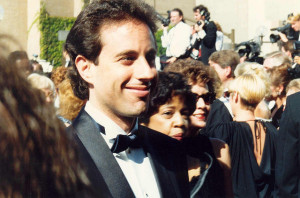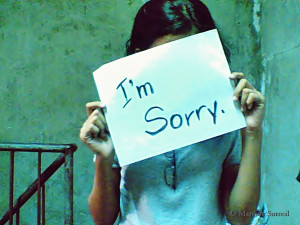A month or so ago, I had the honor and privilege of writing a fun blog post for one of my favorite public speaking blogs – Big Fish Presentations.
I wrote about the top 7 rookie mistakes of pubic speaking and I think it came out pretty good. I’ve spent over three years honing my speaking skills, watching others hone in their skills too — and with all of this time, I’ve actually learned a thing or two.
The moment the blog post went live, I’d realized a few other popular “rookie mistakes” which I’ve decided to compile below. Although, be sure to first get caught up on the initial blog post which inspired this post – 7 Rookie Mistakes of Public Speaking.
8: Â Apologizing to the audience.Â
We’ve all heard it before – and apology from a presenter about not preparing enough, tech malfunctions noticing a typo on a slide or even apologizing about how they might be “off” because of a lack of sleep. Â There is no better way to look like an amateur than by committing these mistakes, then announcing them. We know why you’re doing it, but it doesn’t work.
Another reason this might come off poorly is, as Geoffrey James over at INC points out, it causes you to start off on a negative note and look like the victim from the very beginning. Or worse, it can make the person look out of control and like somebody who tends to make excuses, especially in the instances that could have been solved or even prepared for beforehand.
How to avoid this mistake: Don’t bring your sins to light. Ignore them, and those typos. Often times the audience won’t notice, but if they do, there is no reason to call yourself – or an egregious slide error to attention. If you’re in the need of a pick-me-up, there is always caffeine or there are a few breathing techniques that can awaken your mind.
9: Covering too much information.
This mistake is quite easy to make and many of us have been on the receiving end of too much information. Many people will first ask – how do I even know if I’m covering too much information? Well, there are a few good tell-tale signs and they are as follows:
- You’re constantly going over time during each dry run.
- The folks who you’ve asked to give you feedback nicely mention that it is a little long or – “full of content.”
- You’re covering more than one major topic. While you will cover more that fall under this umbrella topic – trying to hold too many umbrellas in one presentation can cause confusion, or cause folks to feel overwhelmed.
- You’re finding your slides to be chock-full of words.
- You want your audience to remember/learn more than five items. Usually, three is a golden number, but sometimes that isn’t enough. It is probably a good rule of thumb not to cover more than five points.
How to avoid this mistake: Do multiple dry-runs and time yourself, or better yet – videotape yourself. This way you can see how your time stacks up and how your content might be perceived by the audience. Also considering asking a friend or two to sit in and provide you with honest feedback in regards to the content And lastly, if you’re covering too much – don’t be afraid to “kill your darlings.” Your darlings are referred to the parts of your content or story that you absolutely love, but don’t actually add value. Be a harsh critic on yourself to find where the darlings lie, and then use good judgment on whether they’re valuable to the topic being presented.
10: Unusual (and awkward)Â body movements.Â
In the other article on Big Fish we talk a bit about body language as well, but here I’m referring strictly to the ones that are especially awkward. You know – the ones that people can’t help but notice, no matter how great your content is. The reason these are so bad is because they’re the unconscious body language ticks that arise – and many presenters might not even be aware that they’re doing. And in a previous post, we already established that it’s not “what you say that” that matters but really “how you’re saying it” as body language accounts for 93% of communication that occurs. Some uncommon body movements to be aware of:
- Shifting from body weight on one leg then the other. This is especially apparent in men, but doing this continuously can easily give off the impression of uneasiness in the presenters self or information.
- Playing/fidgeting with hair and/or jewelry. This is one is more of a female phenomenon. The reason it occurs is that we find solace and comfort in touching our hair or even fidgeting with a piece of jewelry. However, if done too much, it can be distracting and give off the impression of – you guessed it – uneasiness.  One last thing, another INC article suggests that this could be also our unconscious need to always look our best – thus the constant grooming.
- Small scale gestures: Also referred to in the business as “t-rex arms.” These are the obviously too small-scale gestures that nobody would do in their actual daily life. It’s usually a symptom of being uncomfortable being on stage.
- Large scale gestures: When the gestures are obviously too large for the topic or the presenter, it comes across as disingenuous – which no presenter should be with their audience. Â Try to make sure you’re not overcompensating for nervousness by going overboard with the gestures.

How to avoid this mistake: Practice – and practice with a purpose. Record yourself with video while presenting to a group of friends in a somewhat formal environment, and be sure to pretend as if this were the actual presentation. Mimicking the situation that you’ll be in will help you to identify, from the video and your friends, any non-verbal ticks that might arise.
11: Not knowing when to stop.
As any good comedian will tell you, they have a few jokes they plan to end on, but if one is a slam dunk and gets a ton of laughs – that’s where they’ll stop. Of course, they could chance it and continue on with their jokes in the hopes that they continue to get funnier and funnier (is that a word now?). However, most of the experts will tell you that it’s not worth it – they recommend always ending on a high note.
And to be quite honest, this is something you’ll see tons of newbs do too. They are finally getting their moment up in front of others, they’re actually starting to enjoy it and people seem to be enjoying it too. If they’re getting laughs, some folks will try to get more and more laughs and while that might be true – there always comes a point, if it’s too long, when people wonder when it will be over. Â Or worse, they end on a … not so great note.

Flickr User: alan-light
How to avoid this mistake:Â Stack the deck – or presentation in this case – in your favor. Ensure you have a strong, profound statement or call to action to end with to ensure proper closure. And if there is any time you’re thinking about “winging it” – the closing is not the ideal time.
These are a few of the other rookie presentations mistakes to avoid. If you haven’t already, be sure to check out the other post to see the first 7 and leave your thoughts below.
